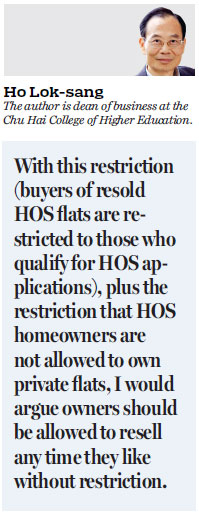HOS home sales fine - but only to HOS qualifiers
Updated: 2017-08-08 08:38
(HK Edition)
|
|||||||
Ho Lok-sang notes the problem of subsidized property flowing into the market, and suggests resale always be restricted to buyers qualifying for subsidized housing
Traditionally Hong Kong's Home Ownership Scheme (HOS) housing, as well as privatized housing under the Tenants Purchase Scheme (TPS), requires repayment of the owed land price premium before owners can sell in the open market. The Housing Authority can sell these units below market price because purchasers have not paid the full price of the land. Under the traditional thinking, the land premium owed has to eventually be paid at the prevailing market price if these units are sold or rented out in the open market. Starting in June 1997, however, the Housing Authority established the HOS Secondary Market Scheme, and let HOS owners sell to Green Form Certificate holders without paying the owed land premium. The logic is that when a Public Rental Housing (PRH) tenant buys an HOS unit in the secondary market, a PRH unit will be made available to applicants. Since PRH is socially very costly to produce, and since developing public housing may take a long time, the social benefit of the HOS Secondary Market Scheme is believed to be well justified, even though it means the Housing Authority has to forgo the land premium. Since the new purchaser could continue to resell to a green-form applicant without paying the land premium, there is a chance the authority might never be repaid the land premium.
As it turns out, many HOS and TPS homeowners profited significantly, taking advantage of the Secondary Market Scheme. A PRH flat in Yiu On Estate in Ma On Shan was recently sold at HK$3.9 million to a green-form applicant - a per square foot price of HK$6,522, comparing with a premium-paid price of HK$8,753 per square foot for another flat in the same estate which was sold at HK$4.28 million. This latter flat had been purchased by the sitting tenant at HK$199,000 in 2000. The figures suggest that paying the land premium and selling in the open market is not particularly attractive. The TPS owner captured, in 17 years, a gain of well over 1,000 percent, whether or not the unit is sold in the open market, premium paid, or in the secondary market, pre-premium. In Tin Shui Wai, an HOS flat was sold at over HK$4.68 million pre-premium, for a gain of some 80 percent in three years.

Several questions immediately come to mind:
First, is there a problem when public housing - which is intended to provide a roof for those who need assistance - becomes an investment vehicle?
Second, if more and more owners choose to sell in the secondary market, the land premium incomes of the Housing Authority will fall. Will this create financial pressure on the Housing Authority?
Third, do we need to change the restrictions on resale? If so, how?
Professor Richard Wong of the University of Hong Kong does not think the first problem is a problem at all. Privatized public housing or HOS housing, according to him, allows grass-roots people to share the gains from economic prosperity.
This sounds great but then there are two problems. One is that the prospective economic gains will draw applicants who have eyes on financial gains. This will make it more difficult for applicants with genuine and pressing needs to be allotted a flat.
Another problem is that when a PRH or HOS flat is sold for a profit, that flat is no longer available to serve the needs of the poor. Replacement cost is ostensibly very high, and that includes both land cost and construction cost.
Chief Executive Carrie Lam Cheng Yuet-ngor has been reported to be actively thinking about exempting HOS owners from having to pay a land premium before resale. But this could increase financial pressures on the Housing Authority.
I would advise that exempting HOS owners from having to pay a land premium before resale is fine, as long as buyers of resold HOS flats are restricted to those who qualify for HOS applications. With this restriction, plus the restriction that HOS homeowners are not allowed to own private flats, I would argue owners should be allowed to resell any time they like without restriction. The flats will forever be reserved for serving the needs of the housing-needy households. The second-hand market prices will be much lower, and homeownership will become much easier. Although the Housing Authority will not collect land premiums, they will also have less pressure to produce more units, since investment-minded purchasers will go to greener pastures.
Of course my two proposed restrictions should not be imposed on existing HOS owners who had bought with the understanding that old rules apply. But for new HOS housing, the two proposed restrictions should be announced and enforced. This will drive investment-minded people to the private market, leaving only the housing-needy households in the queue for HOS housing, and that will be good for Hong Kong.
(HK Edition 08/08/2017 page8)